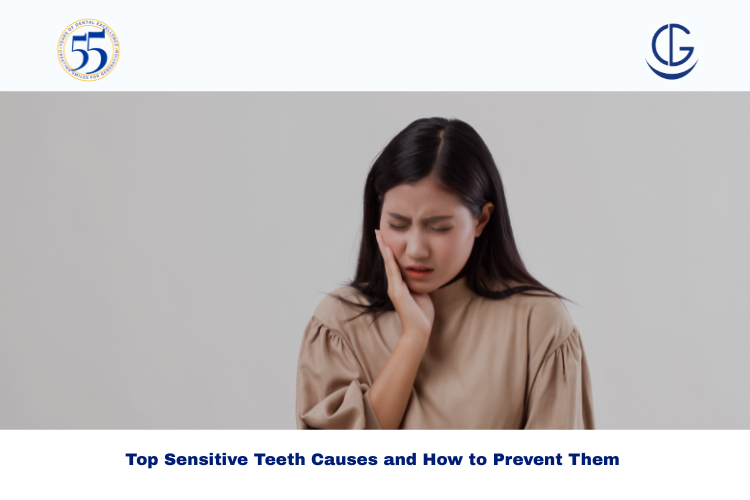Schedule Appointment



Do you wince when you eat ice cream or when you drink hot coffee? You are definitely not alone. Tooth sensitivity is a common dental issue that affects millions of people. Sensitive teeth causes are the first step toward prevention and relief. At Dr Gowds Dental Hospital in Hyderabad, we have treated innumerable tooth sensitivity patients. We certainly know how tooth sensitivity is very disturbing. So here we give you top 10 reasons to understand what can be the causes of tooth sensitivity and the methods which can be used to solve the problem. Besides, you should not overlook the signals, your oral health condition may be something that needs your attention.
Tooth sensitivity, also called dentin hypersensitivity, refers to sharp, sudden pain or discomfort in the teeth when exposed to hot, cold, sweet, or acidic substances. It often occurs when the enamel is worn down or gums have receded, exposing the underlying dentin.
One of the most common sensitive teeth causes is the erosion of tooth enamel. This outer layer protects the inner nerve endings. Acidic foods, sugary drinks, and aggressive brushing can all wear it down.
Tip: Avoid acidic drinks, use a soft-bristled toothbrush, and rinse with water after meals.
Gum recession exposes the tooth root, which lacks protective enamel. This can lead to pain and heightened sensitivity.
Common Causes:
Remedy: Use a desensitizing toothpaste and consult your dentist about gum grafts if necessary.
Cavities create holes in the enamel, exposing the sensitive dentin beneath. If left untreated, they can reach the pulp, causing severe pain.
Action: Regular dental check-ups can detect decay early. A simple filling can often solve the issue.
A crack in the tooth can reach the inner layers, triggering sensitivity to temperature and pressure.
Warning Sign: Pain when biting or chewing.
Solution: See a dentist immediately. Depending on the severity, you may need bonding, a crown, or even a root canal.
Grinding your teeth—especially during sleep—can wear down enamel and cause sensitivity.
Home Tip: Use a nightguard and manage stress, as anxiety often triggers bruxism.
Some over-the-counter whitening products contain harsh chemicals that can irritate the teeth and gums.
Preventive Tip: Choose dentist-approved products and avoid excessive use. If sensitivity persists, discontinue the product.
Frequent consumption of citrus fruits, sodas, and wine can erode enamel over time.
Good to Know: Rinse your mouth with water after consuming acidic foods and wait 30 minutes before brushing.
Using too much force or the wrong toothbrush can damage enamel and gums.
Pro Tip: Brush gently with a fluoride toothpaste for sensitive teeth. Replace your toothbrush every 3 months.
It’s normal to experience temporary sensitivity after fillings, crowns, or cleanings.
When to Worry: If the sensitivity persists beyond a week or worsens, consult your dentist.
Advanced gum disease not only leads to gum recession but also exposes sensitive tooth roots.
Symptoms: Bleeding gums, bad breath, loose teeth.
Treatment: Professional cleaning, scaling and root planing, or surgery may be required
If sensitivity continues despite home remedies or worsens over time, don’t delay seeing a professional. Persistent sensitivity can indicate serious issues like nerve damage or infection. At Dr Gowds Dental Hospital, our team in Hyderabad uses advanced diagnostics to pinpoint the sensitive teeth causes and offer personalized treatment plans.
To be clear, tooth sensitivity is not the kind of issue that you should deal with by avoiding it (in any sense). Identifying the reasons for sensitive teeth can help you become more aware of your oral health and prevent the occurrence of chronic disease. To be honest, it doesn’t really matter if you change your brushing routine or set up an appointment with Dr Gowds Dental Hospital, it’s all about choosing the best steps that would give you sustained relief. And the earlier, the better when it comes to saving your teeth from irreversible damage.
Common sensitive teeth causes are enamel erosion, gum recession, tooth decay, and grinding. Each of these conditions affects the sensitive parts of your teeth which results in pain.
Tooth sensitivity of a low level can come back to normal by cleaning your mouth well and using a suitable toothpaste. However, if the issues with sensitive teeth are of a deeper nature like decay or cracks then no treatment, the problem, will not be solved.
Avoid acidic foods (citrus, tomatoes), sugary snacks, and cold or hot beverages. These things are the reason for the most common sensitive teeth causes and if you consume them they will get worse.
The inflammation can be described as sudden, frequent, and even getting worse from time to time sensitivity thus indicates the involvement of the deep sensitive teeth causes like cavities or infections. You should visit your dentist without delay.
Yes, definitely. Dr Gowds Dental Hospital in Hyderabad provides the best professional team to solve all sensitive teeth causes, they use a variety of diagnostic tools and different treatment techniques to get the desired results of relieving the pain and keeping it away.